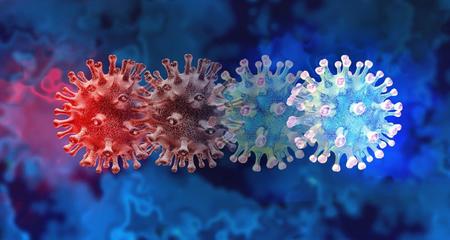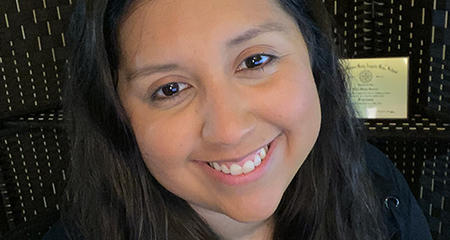COVID-19 is a respiratory disease caused by SARS-CoV-2, a coronavirus discovered in 2019. The virus spreads mainly from person to person through respiratory droplets produced when an infected person coughs, sneezes or talks. It can be very contagious and spreads quickly, so it’s important to take steps to protect yourself and others.
COVID-19 Symptoms
Possible symptoms include:
- Fever or chills
- Cough
- Shortness of breath or difficulty breathing
- Fatigue
- Muscle or body aches
- Headache
- New loss of taste or smell
- Sore throat
- Congestion or runny nose
- Nausea or vomiting
- Diarrhea
Get Tested
At-home COVID-19 tests give rapid results and can be taken anywhere. You can buy tests online or in pharmacies and retail stores. With an at-home test, positive results are very accurate and reliable. However, they are not as good at detecting the virus as a laboratory-based PCR test, meaning you might get a false negative result. For this reason, it is recommended that you repeat at-home testing and take precautions to protect yourself and others, including washing your hands often, wearing a mask, social distancing, and cleaning and disinfecting “high-touch” surfaces.
We do not offer walk-in tests for COVID-19. If you need a laboratory-based PCR test, please select from the options below. Note: COVID-19 testing is only available for established patients.
Start an E-Visit
You’ll answer questions in MyChart about your symptoms. A doctor or clinician will review your answers and recommend next steps for testing and care. Available for established patients with a Froedtert & MCW primary care doctor.
Contact Your Doctor or Clinician
If you think you may have COVID-19 or have questions and would like to speak to someone about your options, call your doctor or clinician’s office.
Don’t have a Froedtert & MCW doctor? Find a doctor or launch an on-demand video visit.
Get Vaccinated
The COVID-19 vaccine protects you from getting sick with COVID-19 and reduces the severity of your symptoms if you do get sick. Updated versions of the vaccine protect against currently circulating variants of COVID-19. We encourage you to get vaccinated wherever it’s convenient for you. Many local pharmacies and retailers offer walk-in vaccinations. If you prefer, you can schedule an appointment through the Froedtert & MCW health network by following the instructions below or calling your doctor’s office.
Schedule an Appointment Through MyChart
- Access MyChart online or through the Froedtert & MCW mobile app. Create an account if you haven’t already.
- Select 'Visits' and 'Schedule an appointment.'
- Under 'Tell us why you’re coming in,' select 'COVID-19 Vaccine' and follow the prompts.
- Note: For individuals under age 18, MyChart proxy access must be in place prior to scheduling through the app or online.
Prepare For Your Appointment
To save time during your visit, complete PreCheck-In in MyChart up to three days before your appointment. Your appointment will take approximately 30 minutes including a 15-minute observation period after you receive the vaccine. On the day of your visit, please bring the following:
- Photo ID
- Health insurance card
- Calendar to assist in scheduling your next appointment, if needed
COVID-19 Testing and Vaccine Frequently Asked Questions
-
Should I be tested for COVID-19?
If you are currently experiencing COVID-19 symptoms, you should be tested. If you do not have symptoms but have recently been exposed to COVID-19, you should wait at least five days after your exposure date before getting tested.
-
How do I get tested for COVID-19?
You do not need to come to the clinic to get tested. At-home COVID-19 tests give rapid results and can be taken anywhere. You can buy tests online or in pharmacies and retail stores.
We do not offer walk-in tests for COVID-19. COVID-19 testing is only available for established patients.
- If you need a laboratory-based PCR test and are an established patient, please start an E-visit or contact your doctor.
- Patients new to Froedtert & MCW health network should start an on-demand video visit to get established.
-
What do I do if I test positive?
No matter what type of test you use (including at-home test kits), if your result is positive, stay home and away from others. Most people who test positive for COVID-19 recover at home without additional medical treatment or need for testing. Keep in touch with your doctor or clinician using MyChart or virtual visits whenever possible.
If your condition worsens or you experience severe symptoms such as difficulty breathing or chest pain or pressure, call 911. People who are older, are immunocompromised or have underlying health conditions should pay particularly close attention to these symptoms. Antiviral medications may be treatment options. Talk with your doctor or clinician to determine what is the best option for you.
-
Who is most at risk for COVID-19?
Some people are more likely than others to get very sick if they get COVID-19. This includes people who are older, are immunocompromised or have underlying health conditions.
-
How often do I need to get vaccinated, and how many doses do I need?
It’s important to stay up-to-date with the COVID-19 vaccines, especially as updated vaccines become available. How often you get vaccinated and the number of doses needed depends on several factors including your age, previous vaccination history and if you are immunocompromised. For the latest recommendations, please visit the CDC website.
-
How much does the COVID-19 vaccine cost?
COVID-19 vaccines are covered with no out-of-pocket cost for most people living in the U.S. through their private health insurance, Medicare or Medicaid plans. Patients without health insurance or without insurance that covers COVID-19 vaccines may have access through the temporary Bridge Access Program. To find a provider that offers no-cost COVID-19 vaccines through the Bridge Access Program, visit vaccines.gov
-
Can I get a COVID-19 vaccine if I’ve had COVID-19?
Even if you have had COVID-19, you should still be vaccinated. Getting a COVID-19 vaccine provides added protection against the virus and lowers your chance of reinfection. If you currently have COVID-19, you should wait to get vaccinated until your symptoms are gone and you have met the isolation guidelines from the CDC.
-
Are there any side effects for the COVID-19 vaccine?
Side effects after getting a COVID-19 vaccine can vary from person to person. Some people experience a little discomfort and can continue to go about their day. Others have side effects that affect their ability to do daily activities. Side effects generally go away in a few days. Even if you don’t experience any side effects, your body is building protection against the virus that causes COVID-19.
-
Can I take an over-the-counter pain medication before I receive my COVID-19 vaccination?
If you do not regularly take over-the-counter medications, you should not take them before you get a COVID-19 vaccination. Doing so may alter your immune response. You may take over-the-counter pain medication after receiving the vaccine to relieve any possible side efforts. If you have additional questions regarding your medications, we recommend consulting your primary care physician or clinician before scheduling your vaccination appointments.
-
Can I get a COVID-19 vaccine if I have recently received other vaccinations, like a flu shot?
There is no recommended waiting period between getting a COVID-19 vaccine and other vaccines. You can get a COVID-19 vaccine and other vaccines, including a flu shot, at the same time. Experience with other vaccines has shown that the way our bodies develop protection, known as an immune response, and possible side effects after getting vaccinated are generally the same when given alone or with other vaccines.
-
How can I get my COVID-19 vaccination records?
You can access your COVID-19 vaccination records or test results through the Froedtert & MCW mobile app. Download the Froedtert & MCW app if you haven’t already.
Whether it’s for work, travel or a local event, your COVID-19 vaccination records and test results can be shared three ways via the Froedtert & MCW mobile app.
- Generate a QR code* to be scanned right from your mobile device.
Download a PDF with your vaccination QR code*.
Export your COVID-19 records to another app.*Please note that an ordinary QR scanner will not be able to read your QR code. To protect your privacy, these QR codes need to be scanned by devices equipped with specific verification software in order to show meaningful data.
COVID-19 Treatments
The COVID-19 treatment options available in the form of a pill are the antiviral medications Paxlovid™ and molnupiravir. They were developed by the pharmaceutical companies Pfizer and Merck to prevent people who are at high risk from becoming severely ill after infection with the SARS-CoV-2 virus, the virus that causes COVID-19. The FDA issued emergency use authorizations in late 2021 for both medications, and approved Paxlovid in May of 2023. The pills are available by prescription from some Milwaukee-area pharmacies.
Another antiviral treatment, remdesivir, sold under the brand name Veklury®, is also effective. Remdesivir was developed by the drugmaker Gilead. It is a 3-day IV treatment.
Antiviral pills and IV therapy are available to eligible people who are not hospitalized with COVID-19.
COVID-19 Treatment FAQ
-
How do the COVID-19 pills work?
Paxlovid and molnupiravir are antivirals that work by stopping the viral replication process. This reduces a person’s viral load and lessens the severity of their symptoms. However, the way the drugs function is slightly different.
Paxlovid is a protease inhibitor that blocks a part of the virus’ life cycle. Protease inhibitors bind to the enzyme the virus uses to replicate and prevent the production of new viral particles. Molnupiravir is a nucleoside analogue, which means it stops the viruses’ genetic material from being accurately replicated, rendering new viral particles noninfectious.
Both pills require a five-day course of treatment. Most people who are prescribed Paxlovid take three tablets at the same time, twice a day (there is a dose reduction for people with moderate kidney disease). People prescribed molnupiravir take four capsules twice a day.
-
How effective are the COVID-19 pills?
Clinical trials of Paxlovid and molnupiravir were so successful, they were stopped early. Results showed the pills were much more effective than placebos. Pfizer’s clinical trial found Paxlovid reduced a person’s risk of hospitalization by 89% when given within three days of symptom onset. Merck’s clinical trial showed molnupiravir cut the rate of hospitalization or death by 30% when the drug was given within five days of symptoms onset.
It is important to note that both of these clinical trials were conducted in a small number of patients, and molnupiravir is still authorized for emergency use but are not FDA-approved, and the full extent of risks and benefits may not yet be determined.
-
How does remdesivir work?
Remdesivir is an antiviral medication administered by an intravenous (IV) method that works against the COVID-19 virus by directly stopping the viral replication process. It interferes with one of the key enzymes the virus needs to replicate and stops the infection from progressing. Remdesivir was one of the original treatments for COVID-19 when it was approved for use by the FDA in 2020. At the time, it was only for use in patients who were hospitalized with the virus. In January 2022, in response to the surge of the omicron variant, the FDA expanded remdesivir’s use for outpatients with mild-to-moderate COVID-19.
-
How effective is remdesivir against COVID-19?
The clinical trial that led to the expanded use of remdesivir for outpatient treatment showed that a 3-day course of the medication started within 7 days of COVID-19 symptom onset reduced a person’s risk of hospitalization or death by 87%.
Outpatient treatment with remdesivir requires an intravenous infusion given over at least 30 minutes daily for three days in an infusion treatment center.
-
Who is eligible for the COVID-19 treatments?
Not everyone who tests positive for COVID-19 will be able to get a prescription for Paxlovid, molnupiravir or remdesivir. Per the FDA, Paxlovid and molnupiravir are only authorized for use in people who have tested positive for COVID-19, are experiencing mild-to-moderate disease and are at a high risk for progression to severe disease. Paxlovid is authorized for people ages 12 and older. Molnupiravir is authorized for people ages 18 and older. Neither pill is intended or authorized for people who require hospitalization for severe COVID-19. They are also not intended for the prevention of COVID-19 in someone who was exposed to the virus. Remdesivir is authorized for anyone who tests positive for COVID-19, has mild-to-moderate symptoms and is at high risk of severe illness. With the expanded use of remdesivir in 2022, you no longer have to be hospitalized to be eligible for treatment.
These medications are widely available. If you tested positive for COVID-19 in the last five days, contact your doctor or clinician to request one of these treatments or to answer questions about your eligibility or risk factors.
-
Which COVID-19 treatment is right for me?
Based on your health history and current medications, your health care team will determine which COVID-19 treatment is best for you. This will also depend on availability, as the Wisconsin Department of Health and Human Services oversees the distribution of supplies and determines how much of each drug is sent to Wisconsin hospitals.
The Froedtert & MCW Population Health and Medical Education team and Antimicrobial Stewardship Team developed a centralized process to make it easier for patients to receive the right COVID-19 treatment and for providers to prescribe it, and recently expanded the use of Paxlovid to our providers throughout the Froedtert system. Providers may directly prescribe Paxlovid or submit a referral to our central team, and our database matches each patient with the best treatment, based on their risk factors, and in some cases, lab results, which are ordered the same day.
-
What are the side effects of the COVID-19 treatments?
Pfizer’s Paxlovid is a combination of two drugs, nirmatrelvir and ritonavir. Ritonavir is widely known for its use in HIV medications. It is not active against COVID-19, but it acts as a boosting agent to increase the levels of nirmatrelvir in the body to fight the virus that causes COVID-19. Many widely used medications for chronic conditions, like blood thinners or antidepressants, have known drug interactions with ritonavir.
Some of these drug interactions are manageable by adjusting doses of the other medications, when possible. When this isn’t an option or when interactions could be significant, we direct patients toward an alternative therapy.
Paxlovid isn’t recommended for people with severe kidney or liver disease. The most common side effect is an altered sense of taste that usually goes away after treatment is completed.
Molnupiravir doesn’t have any known drug interactions, and no significant side effects have been reported. However, based on available research, it is not recommended for use during pregnancy. Women of child-bearing age undergoing treatment are asked to use contraception for the duration of the treatment and through four days after the last dose. Men who are sexually active should use contraception during treatment and for three months after the last dose.
Remdesivir is an IV infusion, so there is a chance for allergic/infusion reactions to remdesivir or components of the medications during infusion. Remdesivir is not recommended for people with severe kidney disease or liver disease.
Your health care team will keep track of all of this for you and make sure you are matched with the best treatment for you.
-
What is rebound COVID-19?
Rebound COVID-19 is when a person who has been treated for COVID-19 tests negative, then shortly after, gets symptoms again. Rebound symptoms typically occur within two to eight days of completing a treatment course. Rebound COVID-19 has also been reported in untreated patients and is likely a natural disease process. It is uncommon, happening in 1 – 2% of patients. It is not the same as reinfection with the virus or resistance to treatment.
People with rebound COVID-19 should not be retreated for the virus. They should manage symptoms with over-the-counter medications, as advised by their doctor, return to isolation and wear a face mask. If symptoms progress or become more severe, they should consult with their doctor.
-
Do I need to take the COVID-19 pills or remdesivir if I’m not feeling sick?
The COVID-19 pills and remdesivir are prescribed early in the disease process, within five to seven days of a positive COVID-19 test. People are only eligible if they have symptoms, but during this timeframe, it is possible you will not feel severely ill or you may have milder symptoms. While the decision to move forward with treatment is yours, it is important to understand why your provider recommended the treatment for you.
If you were prescribed a COVID-19 pill or remdesivir , you are part of a group of people that is at risk for worsening disease. Consider the impact this would have on you or your family and take into account the information we have about the medication so far. These medications appear to be quite effective and safe, and they may prevent you from becoming more sick or needing to be hospitalized.
If you’re prescribed antiviral therapy, you are still asked to isolate while you are undergoing treatment, following current CDC guidelines.
-
Are vaccinations against COVID-19 still necessary with COVID-19 treatments?
The COVID-19 vaccines lower your risk of becoming infected and of spreading the virus. The antiviral pills and remdesivir are not substitutes for vaccination because they do not prevent COVID-19, They are treatments.
Public health mitigation measures like vaccines, improving ventilation, testing, following recommendations when exposed, staying home with a suspected/confirmed case, masking and distancing (when directed by CDC based on risk of hospitalization) are still the best ways to prevent you from getting admitted to the hospital for COVID-19. If you are infected, these new medications are a potential lifesaving therapy.
Still Experiencing Symptoms After COVID-19
Being ill with COVID-19 can leave a person with ongoing challenges, even after the COVID-19 infection is no longer active. These challenges can include both medical and emotional symptoms. The Froedtert & the MCW team recognizes that coping with a COVID-19 diagnosis may have an ongoing impact on you and is here to support you through our post–COVID-19 care program.
If you are experiencing persistent medical symptoms that negatively impact your daily function eight or more weeks after your COVID-19 diagnosis, please discuss them with your Froedtert & MCW doctor or clinician to see if our Post-COVID Multispecialty Clinic may be right for you.

Resources From MCW
Find more information and resources about COVID-19 from the physicians and faculty at the Medical College of Wisconsin.
Learn More About Coronavirus
The CDC has the latest information on COVID-19, including risk assessments and vaccine eligibility.
More to Explore





